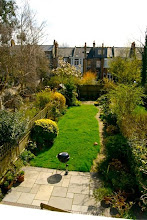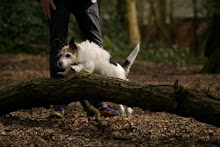I've been baking all afternoon, and most of yesterday, too: lemon cake, banana bread, and flapjacks My oldest son -- who is 18, and towers above me -- just asked, "why have you been cooking so much, mum?" The answer is that a very dear friend of mine died on Friday, and my response to grief is to make cakes. I suppose it's partly practical -- bereavement is exhausting, and people need sweet tea and cake to keep going, so I've been cooking for my friend's family, who live a few houses along the street from me. But on Friday night, I was talking to my friend's mother -- who had just lost her only son that morning, and yet had found the time to buy chocolate for her bereaved grandchildren -- and she told me about a Jewish saying, which is that when someone dies, you should bring round something sweet to feed the family, to take the sour taste of death away.
My father is Jewish, my mother isn't (and they're divorced), and I didn't have a religious upbringing, but perhaps some trace of my Jewish grandmother remains in me, to surface in these circumstances. Or maybe it's something we all do, instinctively: as if in the stirring and tasting of a cake, there is a reminder of the precious sweetness of everyday life.
When my sister was dying of breast cancer -- reluctantly, furiously, unbearably, though she bore her suffering with courage -- she did not lose her taste for lemon cake and chocolate. In fact, she said she needed more of it than before -- that these small things gave her solace, and weere to be treasured, along with the big things in her life (her love for her children and her friends and family).
Usually, I never re-read books that I have written, once they are out in the world -- I feel that they are no longer mine, and instead I entrust them to others, in the hope that they will find kind homes. But today, I have just reached up to the top shelf in my study, and pulled down two of them. Firstly, "Before I Say Goodbye", which is the book that my sister asked me to put together, published a few months after her death, which contains her astonishingly moving writing about her experience of breast cancer, including the columns she wrote for the Observer magazine, which I was editing at the time, and it was just as I remembered -- scattered with references to chocolate cake (including a giant one delivered to the hospice from one of her best friends). And the second book I've looked at is "If The Spirit Moves You", in which I wrote about grieving, and our relationship with the dead.
As it happens, this book begins, "Good Friday in the year 2000. Jesus is dead and so is my sister, and I'm running on a treadmill at the gym, watching MTV with no sound on." It ends a year later, the following Easter, in 2001, when I visited Ruth's grave in Sussex with my husband and two sons.
This is what I wrote at the time -- well, bits of it...
"Easter Eve:
I go to a flower shop and buy pots of white roses and hyacinths -- still living, still sweet scented, not the kind that might wilt the moment you turn and walk away -- to take to Ruth's grave. I also buy a large packet of Easter eggs; the ones that look like speckled birds' eggs, with solid chocolate inside. Her grave is close to the coast, beside an ancient flint church (though to get there, you must first pass a tangle of flyovers and a dual carriageway that leads to a small airport, where light aircraft lift off into the pale grey sky). My sister's headstone is on the far side of the graveyard, sheltered by a hedgerow, where wild flowers grow. She wanted her tumour-ridden body to be burnt first, at a crematorium near here, in the foothills of the South Downs, but to have a headstone in this quiet place -- "Somewhere for you to visit," she said, not long before she died....
On one side of her headstone is a Jewish prayer -- I don't understand the Hebrew -- and on the other side is her name, and her children's, and the dates of her birth and her death. What more can you say in stone? Wisteria is carved onto that side, lavender on the other. She grew wisteria up the front of her house (as I do, too), and lavender in the back garden, like me, like our mother.
The children help me scatter the Easter eggs between the flowers and the headstone. Tom traces his finger around the stone words. It is so cold -- whipped by a sea breeze, almost sleeting. The churchyard is empty apart from the four of us. I'm crying, I can't help it, even though I want to be happy, but no one can see, because the tears are dried on my face by the wind as fast as I can weep them..."
So, there it is again... the reminder that in death, there is still life. And Easter eggs are a symbol of what is born, as well as what is consumed. Or something like that, anyway...
Sunday, 23 March 2008
Subscribe to:
Post Comments (Atom)









8 comments:
I am sorry about your loss. Found this post quite insightful though, and I'm excited to see you're blogging. I read all your books about four or five years ago when I lived in England, and have carted them around the world with me since then. And I'm looking forward to Daphne whenever it comes out in Canada.
All the best to you and your family, on Easter and now that it's spring.
Kerry -- thanks so much for your lovely message, and for taking my books with you. I love the idea of them traveling across the world. Just had a message from someone else in Canada, who ordered "Daphne" from amazon.co.uk. She posted on my first blog, in case you want to get in touch with her. Where are you in Canada? I have relatives in Toronto. It's snowing today in London -- so not very spring-like at at!
At some very deep level I understand just what you're saying here, although I couldn't articulate it that well. When my mother died, almost two years ago now, my first impulse was to go and be with my students because for Mom the most important thing in the world was giving young people the credit that she felt was so often denied them for trying to make something of their lives and break out of the cycle of deprivation from which so many of them had come. Perhaps what we do is recognise something of importance to the person who has gone and find a way of honouring it.
It is so hard losing a friend. Losing a parent is terrible, but natural, losing a friend or a sibling too soon is not. I'm so sorry for the pain you must be feeling. Losing a child must be appalling. The brother of one of my closest friends has just been told that his cancer is terminal; he's 37. For Helen's parents this will be the second child they've lost. Their eldest daughter was killed in a road traffic accident when she was 16. They are a kind and gentle couple in their 70s. I do not begin to know how to help them. I just have to hope that if there is a way it will present itself and I will recognise it. Thank you for this post. It is really important, I think, to be able to speak about our losses, but so very very hard to actually do.
I'm so sorry to hear about the death of your mother. Two years ago isn't a long time, at least not in my experience. And you're right -- we struggle for words in the face of grief and bereavement. I think death has become far more of a taboo subject than it was -- it's as if we've lost the language that goes with the rituals of condolences. Maybe because we live in a culture where we're all supposed to be youthful indefinitely.
As for the couple you mention in your post -- their suffering must be unimaginable. It seems so cruel. I've got two sons, and it would be the worst thing to lose either of them. How would you recover as a parent from that loss? It would be unbearable...
But the one thing I have learnt from my sister's death is that, in larkin's words, "what will survive of us is love". I visited Chichester cathedral over the Easter weekend that I wrote about in my book, and Larkin's poem is beside the Arundel tomb. I'll put it in my next post...
This is the last verse from Larkin's poem, "The Arundel Tomb", which I quoted at the end of "If The Spirit Moves You":
Time has transfigured them into
Untruth. The stone fidelity
They hardly meant has come to be
Their final blazon, and to prove
Our almost-instinct almost true:
What will survive of us is love.
'The Arundel Tomb' was the first Larkin poem I ever read and it is still my favourite. I think the couple I mentioned do know the value of the love that remains. He is a Baptist minister and although I don't share their faith I do really respect the way they live it out. Two very special people.
It's a brilliant poem, isn't it? That note of uncertainty in the lines that lead up to the final one -- which is usually the only one that is quoted. And the acknowledgment of how the representation of love -- or grief -- is never quite the same as the real thing. It was a real lodestone for me when I was writing "If The Spirit Moves You"...
It must help to have faith in these circumstances -- and presumably, as a Baptist minister, faith is the bedrock of everything.
When my mother died in 1995, we asked a stone-carver/letter-cutter friend to make a headstone, inscribed the last line of the Larkin poem - because we knew it would be true. And it was.
A late thank you for If the Spirit Moves You, shared with my daughter and many close friends at times when it would help.
Post a Comment